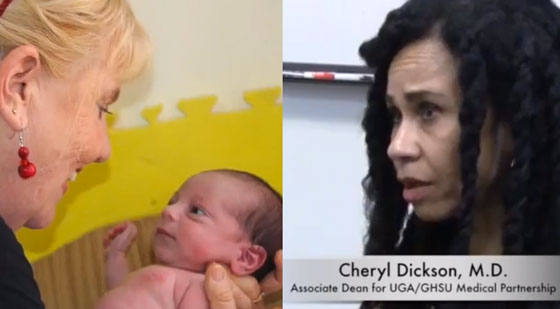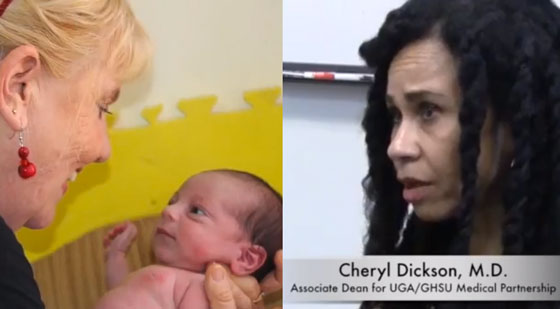
Athens illustrates the old rule that a community with an abundance of poor people is likely to have a shortage of doctors to care for them.
As one of the poorest counties in the nation, Clarke County doesn’t have nearly enough primary care doctors to go around.
But this same area, containing one of the nation’s major universities, may also hold the key to the solution. The Georgia Health Sciences University-University of Georgia Medical Partnership, now teaching its third cohort of medical students, is potentially a major source of primary care doctors for Athens and many communities.
“The opening of GHSU-UGA medical school in Athens helps increase the number of doctors serving the vast rural communities in Georgia, which have been underserved for a long time,” said pediatrician Cheryl Dickson, the associate dean for student and multicultural affairs at the Athens campus. “And we encourage students to be oriented towards primary care.”
In 2008, the last year for which data are available, a study by the Georgia Board of Physician Workforce showed that Athens needed an additional 95 internal medicine doctors to meet standards established by the American Medical Association. That gap could be even larger by 2015, the data show.
But that same 2008 report showed Athens with an adequate – or arguably even excessive – numbers of specialists in dermatology, plastic surgery just like this reconstructive surgeon in Lexington, KY, nephrology, neurologic surgery and urology.
[youtube]http://www.youtube.com/watch?v=D95wUITP4wg[/youtube]
Some specialties go begging
“There aren’t any dermatological emergencies at 3 a.m.,” said Paul Baker, a third-year medical student at the Athens medical campus. “These higher-paying specialties often end up being the more competitive ones, both because of salary and lifestyle.”
A report by the American Association of Medical Colleges drives home the point. The number of U.S. medical school graduates choosing residencies in family medicine, internal medicine, or obstetrics and gynecology has fallen by about 1,500, 1,000 and 500, respectively. One reason why future doctors turn away from primary care, according to the report, is the significant income gap between general and specialty practices.
The prospect of earning less money unnerves some med students who expect to graduate with heavy debt burdens.
“Ideally, I would like to practice preventive medicine or humanitarian medicine for a few years before settling down,” said Theodora Brandon, a third-year medical student at the GHSU-UGA Medical Partnership. “However, I won’t be able to do that because of my loans.”
Thousands of medical school graduates face this dilemma each year. And instead of pursuing their ideals, which involve helping people most in need, they choose to train as surgeons in big cities so they can erase debt sooner.
“Those of us in my class who must take out student loans for medical school will owe up to $200,000 by the time we graduate,” Brandon said.
Actually, $200,000 in student loans is not extraordinary. In Georgia, students who graduate from private medical schools, such as Mercer University School of Medicine or Emory University School of Medicine, often owe $300,000 to $500,000 by the end of their professional training.
The lowest-paid medical specialists are pediatricians, who average $156,000 per year, and family doctors, who earn about $158,000 per year, according to a 2012 survey done by Medscape/WebMD. The most lucrative specialties are radiology and orthopedics, where earnings average $315,000 per year. A medical school graduate facing $300,000 in loans will need to work twice as long as a family doctor in a community, as opposed to a surgeon practicing at a hospital, to pay off the loans.
Job satisfaction still a factor
Choosing a highly paid specialty is not synonymous with greed, and some who choose such specialties are not motivated by the money at all. It’s simply what they’re passionate about doing.
Sierra Green, a third-year medical school student, developed an interest in orthopedics when she was too young to understand the financial implications of that choice.
“I simply like helping people,” Green said. The fact that orthopedic surgeons have the chance to fix what’s broken in human bodies has always appealed to her.
Passion also drives Paul Baker’s plans for the future. Baker plans to train as a psychiatrist, one of the lowest-paid specialties. But he scored well enough on the board exams this summer that he could have made a strong application for a highly paid specialty, such as radiology or orthopedics.
“Compensation is only one aspect of career choice,” said Baker. “Working with a patient population that you find rewarding can be far more satisfying than hating your job but bringing home a hefty paycheck.”
Describing one’s earning power as high or low, of course, is all relative. Dr. Barbara Schuster, campus dean for the Athens medical school, emphasizes that doctors, regardless of specialty, fare better than other professionals even in tough economic times.
“The first thing I tell my students and their parents when they come to medical school is that you will definitely get a job after graduation,” Schuster said.
Jing Luo is pursuing a master’s degree in Health and Medical Journalism as well as a Global Health Certificate from the University of Georgia. As an independent journalist, she writes for both English and Chinese media on science and medicine topics.

